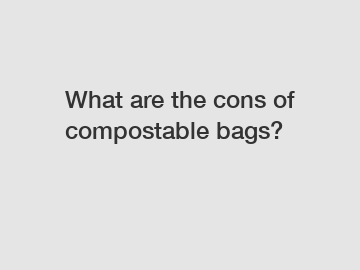What are the cons of compostable bags?
What are the cons of compostable bags?
Compostable bags have gained popularity as an environmentally friendly alternative to traditional plastic bags. However, it is important to consider the potential drawbacks of compostable bags. Despite their numerous benefits, compostable bags also have their disadvantages, mainly revolving around their manufacturing process, limited availability of composting facilities, and misconceptions among consumers.
One of the cons of compostable bags lies in their manufacturing process. These bags are typically made from plant-based materials such as cornstarch, potato starch, or sugarcane, which require significant amounts of land and resources for cultivation. The production of these materials may also involve the use of pesticides and fertilizers, which can have negative environmental impacts. Additionally, the manufacturing process itself can be energy-intensive and emit greenhouse gases, contributing to climate change.

Furthermore, the widespread availability of composting facilities is limited, posing another challenge for compostable bags. While these bags are designed to break down in industrial composting facilities, there are relatively few of such facilities available, especially in certain regions or countries. This means that if compostable bags end up in landfills or conventional recycling systems, they may not decompose as intended, defeating the purpose of their use. It is crucial to ensure proper infrastructure and education regarding composting to fully realize the benefits of these bags.
Misconceptions among consumers also add to the disadvantages of compostable bags. Due to their resemblance to conventional plastic bags, many consumers mistakenly believe that compostable bags can be recycled or will readily decompose in their home composting systems. However, these bags often require specific conditions, including high heat and moisture levels, to break down effectively. Without proper understanding and disposal practices, compostable bags may end up contaminating recycling streams or being improperly disposed of as regular waste, adding to the environmental burden.
Despite these cons, it is important to acknowledge that compostable bags still offer numerous benefits over traditional plastic bags. When properly managed in industrial composting facilities, they can degrade into nutrient-rich compost, contributing to soil health and reducing the need for traditional fertilizers. Additionally, the use of compostable bags can help raise awareness about the need for more sustainable alternatives to single-use plastics and drive innovation in the packaging industry.
In conclusion, while compostable bags have several drawbacks, including their manufacturing process, limited composting facilities, and consumer misconceptions, they still hold potential for reducing plastic waste and driving positive change. To fully realize their benefits, it is crucial to address these issues through improved manufacturing practices, increased accessibility of composting facilities, and comprehensive consumer education. By doing so, we can strive towards a more sustainable future and mitigate the environmental impact of single-use plastic bags.
For more information, please visit what is pbat, biodegradable resin manufacturers, what is pbat.


